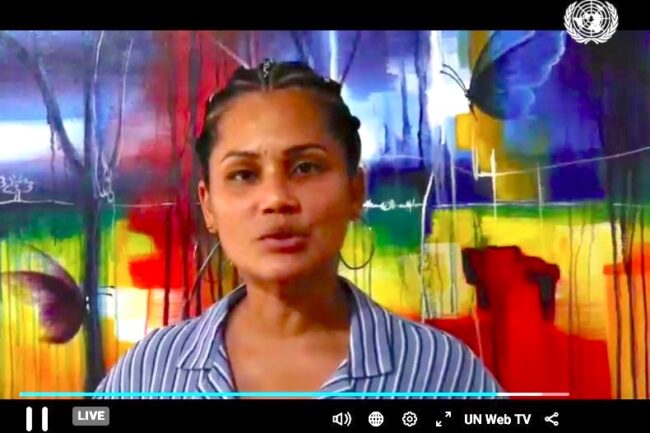Call for an end to systematic human rights violations against indigenous mothers
03.03.22
UN Geneva, Human Rights Council - Our associate member EDO Group was one of four civil society organisations given a speaking slot during the high level segment of the 49th Human Rights Council. In her message, Patricia Marino denounced the many human rights violations and discriminations suffered by indigenous women, mothers especially, in Colombia and beyond, and called for action.

The Guajira region is populated with 65% indigenous and Pre-Columbian people. To this day, these people are driven out of their own land, intimidated and forcibly displaced. They are denied their most basic rights, whether civil, political, socio-economic or cultural. They live in situations of dire vulnerability. This region, which is rich in coal and gas, wind and sun, continues to see the prioritization of multinationals over the welfare and wellbeing of indigenous people, and the sustainability of their land and natural environment.
Indigenous women, mothers in particular, face other challenges and human rights violations. In addition to poverty, exclusion, discrimination and rampant violence, they are totally excluded from local politics and decision-making, impacting their lives. The pandemic only made matters worse.
We are therefore calling on the international community and governments across the world to:
- Stop being complicit in these all too systematic human rights violations against indigenous people
- Hold transnational companies to account so that they fully respect the human rights of indigenous people, work with local communities, and positively and sustainably contribute to the development of these regions
- Work with and invest in local indigenous communities, by developing basic infrastructure and services, including education, health, water and sanitation, transportation and telecommunications
- Recognize that there is much to be learnt from indigenous communities across the world and to therefore give them a seat at every table
![]() Download the full statement: Original Spanish version – English translation
Download the full statement: Original Spanish version – English translation
 Patricia Marino, representing the EDO Group, an MMM associate member in Colombia, delivered her statement by video-message during the High Level Segment of the 49th session of the Human Rights Council, taking place at the UN in Geneva 28th February to 1st April.
Patricia Marino, representing the EDO Group, an MMM associate member in Colombia, delivered her statement by video-message during the High Level Segment of the 49th session of the Human Rights Council, taking place at the UN in Geneva 28th February to 1st April.
The recording of the meeting is available on UN Web TV: Edo Group Intervention starts at about 27:20.
See also our 2021 article on EDO Group’s work with vulnerable mothers in La Guajira
Breaking the Cycle: Gender Equality as a Path to Better Mental Health
18.03.25
The Council of the European Union has taken a decisive step in recognising the vital connection between gender equality and mental health.
Europe Must Listen to Mothers: Our landmark report heads to the European Parliament
28.08.25
On 22 September 2025, the voices of mothers will take centre stage in Brussels. For the first time, Make Mothers Matter (MMM) will present its State of Motherhood in Europe
Belgian Mothers Face Alarming Rates of Burnout and Perinatal Depression, New EU Survey Finds
03.07.25
Belgian mothers are facing a mental health crisis. According to the State of Motherhood in Europe 2024 survey by Make Mothers Matter (MMM) and Kantar, Belgium reports the highest rates








